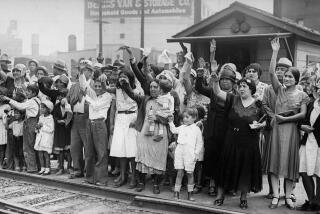Exile of 400 Foes Lifted by Pinochet : Chilean Leader Hails ‘New Political Age’; Allende Kin Returns
- Share via
SANTIAGO, Chile — President Augusto Pinochet, declaring the start of “a new political age” in Chile, on Thursday lifted the forced exile of more than 400 government opponents, including the family of the Marxist president whom Pinochet deposed in a bloody coup 15 years ago.
A few hours after Pinochet’s announcement, Maria Isabel Allende, daughter of the late President Salvador Allende, arrived on a flight from Buenos Aires to an emotional welcome by about 100 friends. She said she had not known of the measure until she was in the air and on her way to demand the right to live in her own country.
“I want to see everything,” she said in her first trip home since 1973, when her father died in the coup. “The mountains, the sea, the family I have here, comrades who are in jail, the slums, the people, the church, everything.”
Pinochet was nominated by the military on Tuesday as the sole candidate in a presidential plebiscite Oct. 5. Victory would give him eight more years in office, while defeat would force the holding of multi-party elections late next year.
The repeal of all remaining exile orders was the latest in a series of actions and statements designed to demonstrate the government’s commitment to restoring civil and political rights. The opposition has sought to frame the choice as one between continued dictatorship and a return to democracy.
Shedding his general’s uniform for a dark suit and tie, Pinochet said in a conciliatory national television address Wednesday night: “This is my promise: to guarantee the effective functioning of democratic institutions.”
Promising a continued economic boom that would generate 400,000 new jobs and decent housing for all within four years, Pinochet appealed to those who have opposed him “to share a future of progress and development.”
Emergency Measures Lifted
Last weekend the government lifted two state-of-emergency measures that had been in effect in various forms since the 1973 coup. Those measures had allowed the government to exile opponents without trial and without the right of return, among other civil rights restrictions. Even though those decrees were lifted, most of those sent into exile could not return without a specific order allowing them back.
In all, about 12,000 Chileans had been forcibly exiled since 1973, according to Roberto Garreton of the Roman Catholic Church’s Vicariate of Solidarity, a human rights organization. He said as many as 200,000 Chileans have gone into exile voluntarily, and many still live abroad.
About 3,700 people still were banished as of September, 1986, but the number had declined to about 430, according to the Interior Ministry. Three human rights groups placed the figure at about 520. They included Allende’s widow, Hortensia Bussi, and his two surviving daughters, Carmen and Maria Isabel. The Allendes’ third child, Beatriz, committed suicide in Cuba in 1976.
The family left the country together on a Mexican presidential plane on Sept. 16, 1973, five days after the coup. According to the government, Salvador Allende had committed suicide.
Communist Leader Covered
Also covered by Thursday’s order are Communist Party leader Luis Corvalan, who is ill and living in Moscow, former Sen. Carlos Altamirano of Allende’s Socialist Party, and Volodia Teitelboim, top-ranking member of the Communist Party’s Politburo.
Allende’s widow, who had said she would never return clandestinely but only “by the front door,” said in Mexico on Thursday: “With tears in my eyes I heard the news of the end of exile. I would very much like to return after many years of absence.”
The Roman Catholic Church welcomed the new measure as very significant. “This decision will contribute to reconciliation among Chileans,” said Bishop Sergio Valech, head of the Vicariate.
The opposition working for a No victory in October reacted warily, however. Juan Pablo Letelier, who returned from voluntary exile in 1983, said Pinochet had acted hurriedly because he was worried that Bussi was on her way and wanted to avoid the internal and international repercussions of barring her admission.
“Pinochet is trying to use (President Franklin D.) Roosevelt’s fireside-chat style in a vulgar attempt by a wolf to put on sheep’s clothing,” Letelier said. “He is waging a populist campaign. Ending the exile is part of this populist process.”
‘Struggle of Our People’
Letelier’s father, former ambassador to the United States Orlando Letelier, died in a bomb explosion in Washington in 1976 that was blamed on Chilean agents.
Maria Isabel Allende told reporters at Santiago’s airport Thursday, “The struggle of our people and the international solidarity have achieved the end of exile.
“After 15 years, here we are. I am in Chile--that’s what matters,” said the 44-year-old sociologist, whose cousin, also named Isabel, is a noted author.
“I can’t vote (because she arrived after registration closed) but it doesn’t matter,” she added. “I am with the people of Chile, I am here for the recovery of democracy. . . .”
Last December the U.S. government had joined Chilean opposition groups in asking for an end to the emergency and other measures many months before the plebiscite to create a climate for a fair and open vote.
More to Read
Sign up for Essential California
The most important California stories and recommendations in your inbox every morning.
You may occasionally receive promotional content from the Los Angeles Times.










